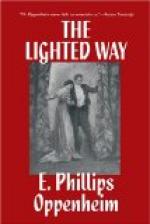“I should really like to hear,” she told him.
“Very well, then,” he replied. “My father was a clergyman, his family was good. He and I lived almost alone. He had an income and his stipend, but he was ambitious for me, and, by some means or other, while I was away he was led to invest all his money with one of these wretched bucket-shop companies. A telegram fetched me home unexpectedly just as I was entering for my degree. I found my father seriously ill and almost broken-hearted. I stayed with him, and in a fortnight he died. There was just enough—barely enough—to pay what he owed, and nothing left of his small fortune. His brother, my uncle, came down to the funeral, and I regret to say that even then I quarreled with him. He made use of language concerning my father and his folly which I could not tolerate. My father was very simple and very credulous and very honorable. He was just the sort of man who becomes the prey of these wretched circular-mongering sharks. What he did, he did for my sake. My uncle spoke of him with contempt, spoke as though he were charged with the care of me through my father’s foolishness. I am afraid I made no allowance for my uncle’s peculiar temperament. The moment the funeral was over, I turned him out of the house. I have no other relatives. I came to London sooner than remain down in the country and be found a position out of charity, which is, I suppose, what would have happened. I took a room and looked for work. Naturally, I was glad to get anything. I used to make about forty calls a day, till I called at your husband’s office in Tooley Street and got a situation.”
She nodded.
“I thought it was something like that,” she remarked. “Supposing I had not happened to discover you, I wonder how long you would have gone on?”
“Not much longer,” he admitted. “To tell you the truth, I should have enlisted but for that poor little girl whom I brought down with me this afternoon.”
His tone had softened. There was the slightest trace of a frown upon her face as she looked along the riverside.
“But tell me,” she asked, “what is your connection with her?”
“One of sympathy and friendliness only,” he answered. “I never saw her till I took the cheapest room I could find at the top of a gaunt house near the Strand. The rest of the top floor is occupied by this girl and her uncle. He is a socialist agitator, engaged on one of the trades’ union papers,—a nervous, unbalanced creature, on fire with strange ideas,—the worst companion in the world for any one. Sometimes he is away for days together. Sometimes, when he is at home, he talks like a prophet, half mad, half inspired, as though he were tugging at the pillars which support the world. The girl and he are alone as I am alone, and there is something which brings people very close together when they are in that state. I found her fallen upon the landing one day and unable to reach her rooms, and I carried her in and talked. Since then she looks for me every evening, and we spend some part of the time together.”




